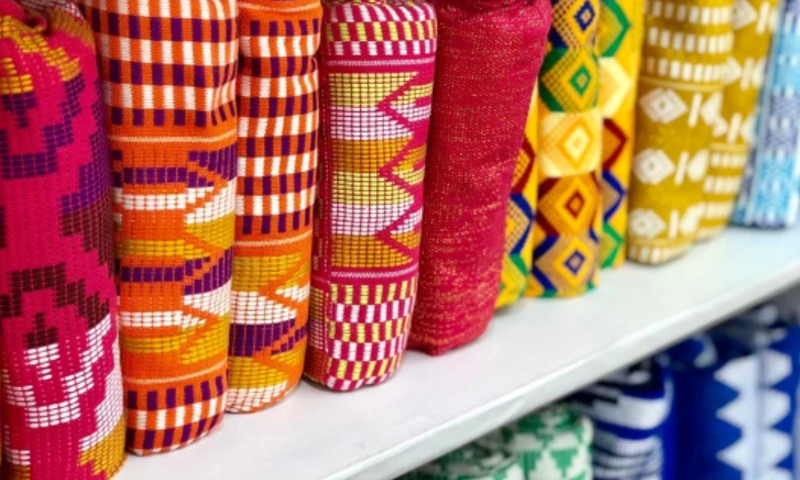
In recent years, Ghana's iconic Kente cloth has graced international runways and adorned influential figures worldwide. Notably, Louis Vuitton's 2021 menswear collection featured Kente-inspired designs, bringing the fabric into the global fashion spotlight. While such exposure celebrates African artistry, it also raises concerns about cultural appropriation and the potential dilution of Kente's profound significance.
Historical and Cultural Significance of Kente
Originating from the Ashanti and Ewe peoples of Ghana, Kente cloth is more than a fabric; it's a symbol of identity, history, and pride. Traditionally reserved for royalty and significant ceremonies, each Kente pattern and colour conveys specific meanings—gold represents royalty and wealth, blue signifies harmony, and black denotes spiritual strength. The intricate weaving techniques, passed down through generations, embody the rich cultural tapestry of Ghana.
ALSO READ: Synthetic hair used by women for braiding contains cancer-causing chemicals - Study reveals
Kente's significance is deeply embedded in various Ghanaian ceremonies and festivals. During the Adae Kese Festival, a sacred celebration of the Ashanti people, chiefs and elders don elaborate Kente garments, symbolising their authority and the unity of their people. In the Volta Region, the Agbamevo Festival, also known as the Kente Festival, showcases the artistry of Kente weaving, featuring competitions and exhibitions that honour the craft's heritage. The Hogbetsotso Festival, celebrated by the Anlo-Ewe people, sees participants adorned in vibrant Kente as they commemorate their historical migration and resilience. Additionally, rites of passage such as the Dipo ceremony among the Krobo people involve young women wearing Kente to mark their transition into adulthood. These events underscore Kente's role as a living emblem of Ghanaian culture and identity.
READ ALSO: ‘Made here, loved globally’ - 5 indigenous African creations and inventions
The Fine Line Between Appreciation and Appropriation
The global embrace of Kente has sparked debates on cultural appropriation. For instance, in 2020, Democratic lawmakers in the United States donned Kente stoles during a protest, intending to show solidarity. However, this gesture was met with criticism, perceived by some as superficial and lacking genuine understanding of the cloth's cultural weight. Conversely, figures like Amanda Gorman wearing Kente-inspired designs by Virgil Abloh highlight how thoughtful integration can honour heritage while promoting cultural appreciation.
Economic and Cultural Impacts of Misappropriation
The surge in Kente's popularity has led to mass-produced imitations flooding markets, often overshadowing authentic, handcrafted pieces. This not only threatens the livelihoods of Ghanaian artisans but also risks eroding the cultural significance embedded in each weave. The commodification of Kente without proper acknowledgment or benefit to its originators exemplifies the adverse effects of cultural misappropriation.
READ ALSO: From kente to co-ords: unveiling the latest Gen Z fashion trends in Ghana
Legal Protections and Their Limitations
Efforts to safeguard Kente's authenticity have gained momentum. In December 2024, UNESCO recognised Kente as an Intangible Cultural Heritage of Humanity, underscoring its global cultural value. While this acknowledgment is significant, enforcing protections against unauthorised reproductions remains challenging, especially on international platforms where intellectual property rights can be difficult to uphold.
Advocating for Respectful Global Engagement
To preserve Kente's integrity, it's imperative to promote respectful engagement. This includes supporting Ghanaian artisans by purchasing authentic products, educating global audiences about Kente's cultural significance, and fostering collaborations that honour its origins. By doing so, we ensure that Kente's global presence uplifts its source communities rather than exploiting them.
READ ALSO: From Condoms to Control 2025: Here's all you need to know about the new era of male contraceptives
Upholding the Integrity of Kente
Kente cloth stands as a testament to Ghana's rich cultural heritage. As it continues to captivate global audiences, we must navigate the fine line between appreciation and appropriation. By recognising Kente not merely as a fashion statement but as a symbol of identity and history, we can celebrate its beauty while honouring its profound significance.
Read Full Story













Facebook
Twitter
Pinterest
Instagram
Google+
YouTube
LinkedIn
RSS